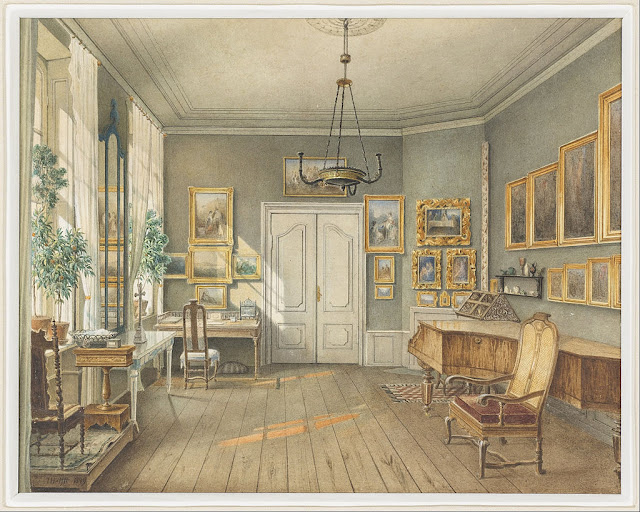 |
| Fanny Mendelssohn's music room at her home with her husband in Berlin (Julius Eduard Wilhelm Helfft) |
How much of Felix Mendelssohn's choral music do you know? He wrote a significant amount from unaccompanied sacred anthems right through to the great oratorios and choral symphonic music. Yet choirs only occasionally explore beyond Elijah. And what about his sister, Fanny Mendelssohn? Whilst her songs and chamber music have become more commonly performed, her choral music lags behind.
A concert from the Crouch End Festival Chorus and the London Mozart Players, conductor David Temple, aims to get us exploring. At Alexandra Palace Theatre on Sunday 23 January 2022, with soloists Julia Doyle, Rebecca Afonwy-Jones, Ronald Samm and Ashley Riches they will be performing Felix Mendelssohn dramatic cantata Die erste Walpurgisnacht along with his setting of Psalm 42 and his chorale cantata Vom Himmel hoch. Alongside these will be Fanny Mendelssohn's cantata Hiob (Job) and her part-song, Lockung.
Felix's Die erste Walpurgisnacht sets a poem by Goethe. Goethe wrote it to be set to music but his friend Carl Zelter had two goes (in 1799 and 1812) and failed, it would be the young Felix who set it in 1833. His large-scale setting of Psalm 42 dates from 1838; setting Luther's German translation of the Biblical text, the piece is one of a number of psalm settings that Felix wrote both for unaccompanied choir and for choir, soli and orchestra. In the late 1820 and early 1830s, Felix wrote a series of small scale chorale cantatas, many of which feel like dummy runs for the choral writing that he would use in Elijah. Crouch End are performing Vom Himmel hoch, dating from 1831.
Fanny Mendelssohn only wrote a relatively small group of choral pieces, besides her partsongs (including the best known, Gartenlieder), there are four cantatas of which three date from the year 1831. Lobesgesang was written to celebrate the first birthday of her son, and her cantata Hiob dates from the same year and was finished in time for her second wedding anniversary. The difficult birth of her son seems to have inspired Fanny to branch out, and instead of songs and chamber music (pieces deemed suitable for a woman to write) she created four cantatas and other large-scale works. The cantatas were not published, they were performed by Fanny at one of her salons and then after her death sat in archives until their rediscovering in the late 20th century.
Full details from the Alexandra Palace website.








%20Bill%20Smith_Norwich%20Cathedral.jpg)
.jpg)
No comments:
Post a Comment